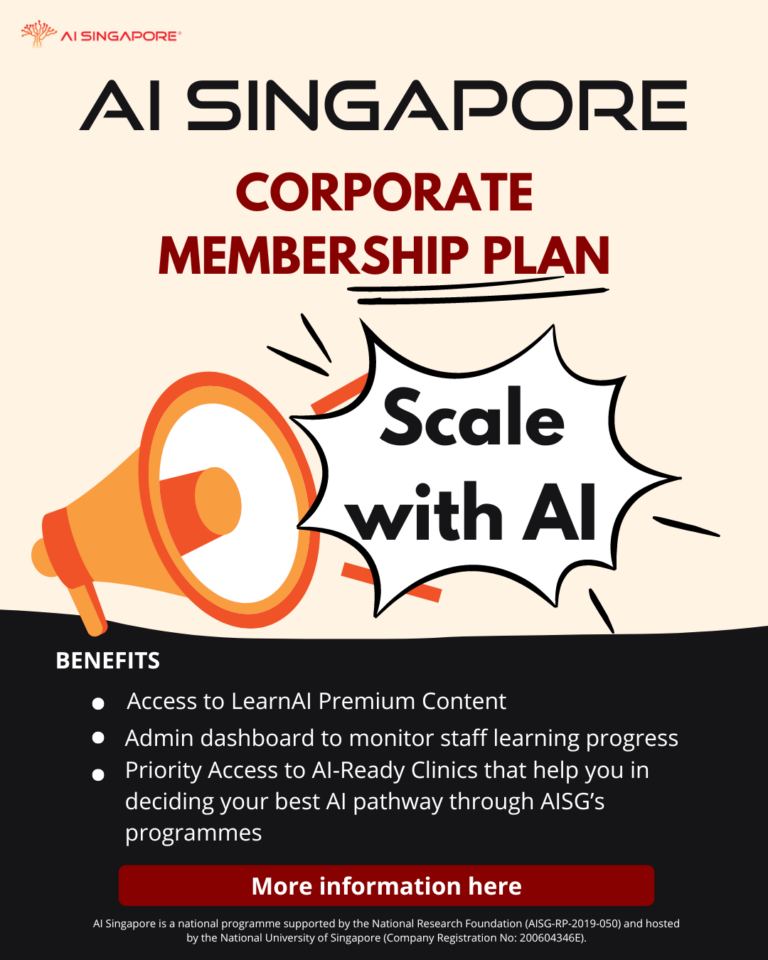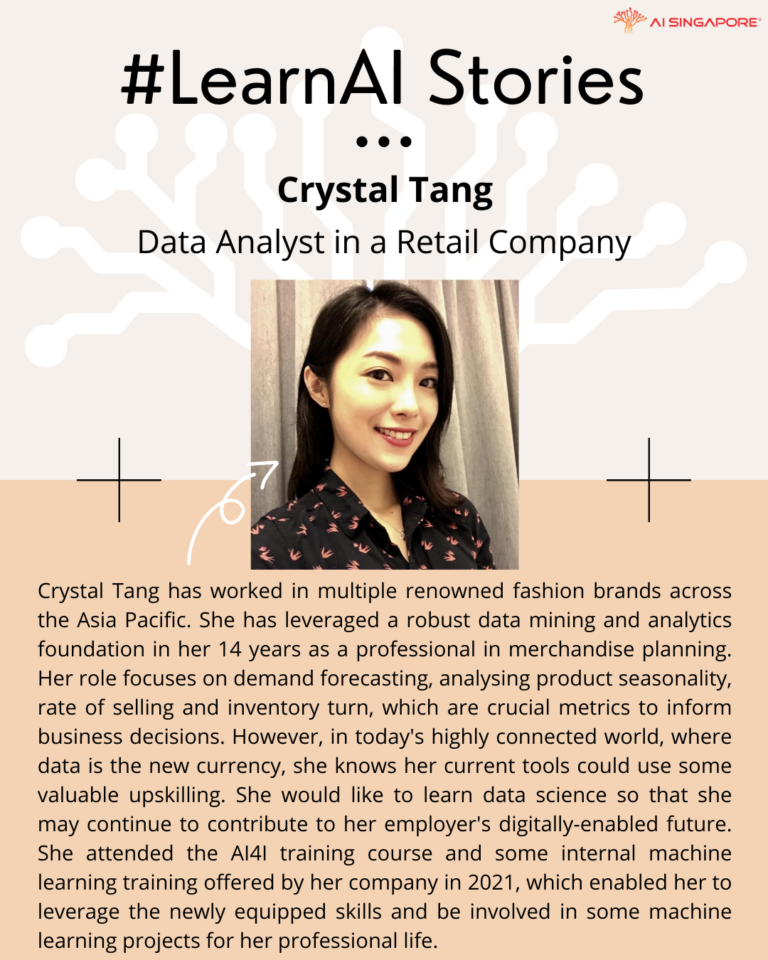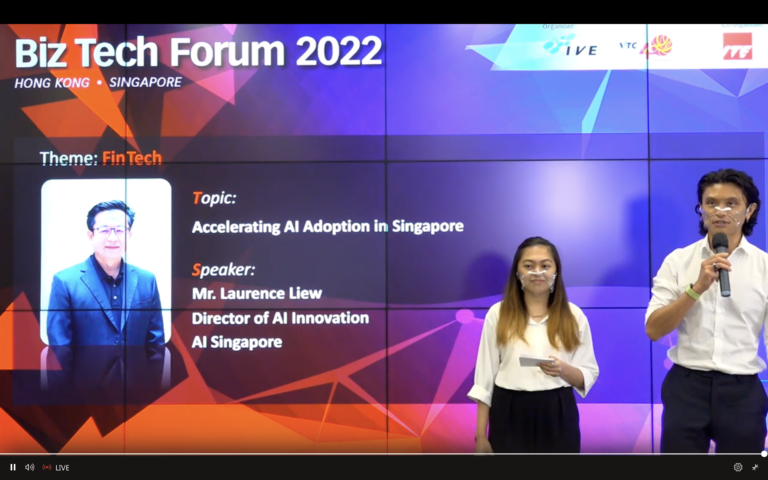AI Singapore’s AI Apprenticeship Programme (AIAP)® was launched in 2018 to groom local Singaporean AI talent and enhance their career with AI-related skills. In the first 2 months, apprentices undergo a self-directed deep-skilling phase that is supported by AISG’s AI engineers, data scientists and computational resources. This is followed by a 7-month on-the-job training where AI apprentices execute real-world projects with the 100 Experiments team or our in-house engineering teams (see below for the different tracks). Since its launch, there have been 10 batches of apprentices who have embarked on this award-winning programme.
Before becoming an AI apprentice, he/she has to pass our recruitment process. The recruitment process consists of three stages and these stages provide a platform for applicants to showcase their technical competencies, knowledge and ability to solve machine learning challenges. Basic knowledge in statistics, data analytics, machine learning and software engineering are essential to excel in the programme.
There are 3 stages of assessment in the recruitment process, namely, Assessment 1, Assessment 2 and Assessment 3.
Assessment 1 is an online assessment. Applicants are given one attempt to complete 15 multiple choice questions, which assess applicants’ competency in Python, software engineering and machine learning. Applicants are given 40 minutes to complete the assessment and achieve a passing score of 80. We recommended studying the AIAP Field Guide before undertaking the assessment.
Assessment 2 requires applicants to perform exploratory data analysis (part 1) and build an end-to-end machine learning pipeline (part 2) on an unseen dataset. In part 1, applicants are expected to extract the dataset from a database before performing an exploratory data analysis of the dataset (EDA). In the EDA, applicants should develop a good understanding of the dataset by analyzing each feature individually as well as their interactions. Applicants should also form hypotheses about the dataset and verify them during the EDA. A good submission involves presenting these findings in a logical and well-thought-out process with insights.
In part 2, multiple machine learning models have to be developed and evaluated based on the given task. In the development of these models, applicants are required to document their design decisions in data pre-processing and reasoning to support their choice of models. In addition, models should be evaluated in a meaningful manner with an evaluation metric that is appropriate for the task at hand. When tackling a problem using different approaches, applicants may have to be creative to find a common evaluation metric to ensure consistency across comparisons.
As part of the submission process, applicants will be required to package their work for review. Submissions should include an iPython notebook (.ipynb file format), Python (.py file format) and bash (.sh file format) scripts. Other files required to recreate the development environment should also be included. Reproducibility is an extremely important tenet in machine learning and the ability to reproduce an applicant’s results is a key assessment point. Submissions should also demonstrate an understanding of software engineering fundamentals and all code submitted should incorporate proper coding conventions while being readable and easily understood.
We do expect applicants to demonstrate a reasonable understanding of key concepts in statistics, data analysis and machine learning. While heuristics, checklists and flow charts for standard practices may be useful, AIAP applicants are expected to understand the rationale behind these tools and be able to decide (and justify) how to apply these ideas in new situations.
As the development of machine learning models is an iterative process with a considerable amount of experimentation, it is recommended that applicants take a principled approach to experimentation and appropriately justify any design considerations.
Lastly, Assessment 3 consists of a technical interview and a group case study exercise. At the start of the technical interview, applicants are to present their submissions. While the content of the presentation is free-form, we recommend applicants make the best use of their time by highlighting areas of their work that are critical and distinctive.
In the group case study exercise, applicants are allowed to work with other like-minded individuals on an undisclosed case study. The team is given time to formulate, document and present their solution. Besides reaffirming the applicants’ technical competencies, the third stage of the recruitment process is also designed to identify applicants who possessed the ability to problem-solve and demonstrate himself/herself as team players.
We are heartened to see the improvement in the quality of applicants in each batch’s application and we hope that the pointers above will be helpful to current and prospective applicants. We would like to wish all applicants the very best of luck in their assessment and we look forward to welcoming you as AI apprentices.
Here are some projects past apprentices have worked on:
- Developing an Automated Q&A Tool with Golden Retriever
- HP Inc., Singapore trials artificial intelligence (AI) solution for Social Distancing in its manufacturing facility
- A Peek into Synergos – AI Singapore’s Federated Learning System
- Artificial Intelligence for Financial Analysis
- Detecting Fraud in Travel and Personal Accident Insurance Claims
Authors
-
 Daniel Ng
Daniel Ng
Daniel is currently leading the Computer Vision Hub and AIAP. He has interest in expanding the usage of computer vision for different business use cases.
-
 Benedict Lee
Benedict Lee
Benedict is an AI Engineer with AI Singapore and is keen on Machine Learning and Natural Language Processing.
-
 Xin Jie
Xin Jie
AI Engineer at AI Singapore
-
 Jin Jun
Jin Jun
AI Engineer with a background in Information Systems. Currently an engineer at cvhubs in AI Singapore.
-
 Wen Xian Ng
Wen Xian Ng
Enjoys solving problems with the use of technology. Currently in the SecureAI team, exploring tools for testing the robustness of machine learning models and incorporating best practices into the ML development process.
-
 Tan Di Wei
Tan Di Wei
An ever-curious individual that enjoys devouring bleeding-edge technologies in the realms of artificial intelligence. Looking for meaningful work where I can utilize my economic competence and computing technical skills to create powerful insights and translate them into valuable services that can disrupt and develop industries. Currently, I work as an A.I. Engineer with 5 years' experience in corporate functions (compliance, cost control, management, contracts), software development, artificial intelligence, and construction domains. my career has enabled me to develop multi-faceted skillsets comprising of software development, data analysis, and machine learning applications on top my corporate capabilities.
-
 S T
S T
Sidney is an AI Engineer at AI Singapore and is ever-aspiring to become a Data Unicorn. Having studied from Psychology, he has honed his mind-reading skills to read an AI Agent's mind.





